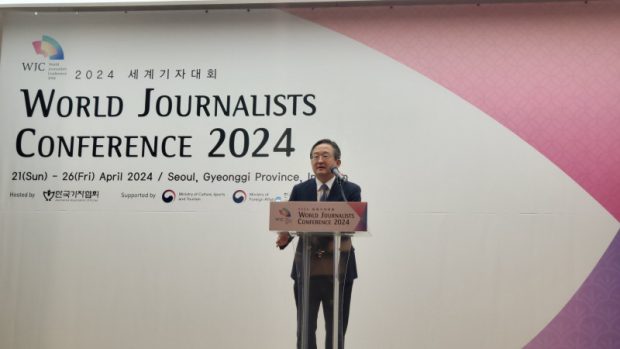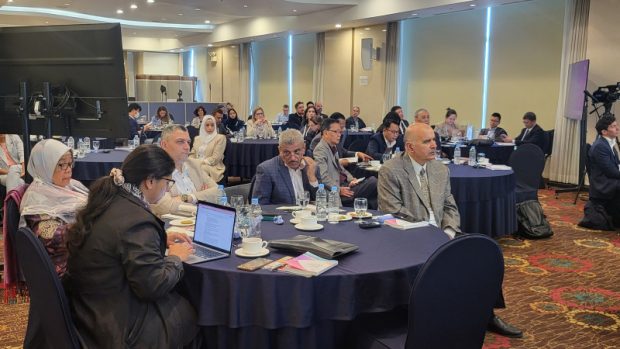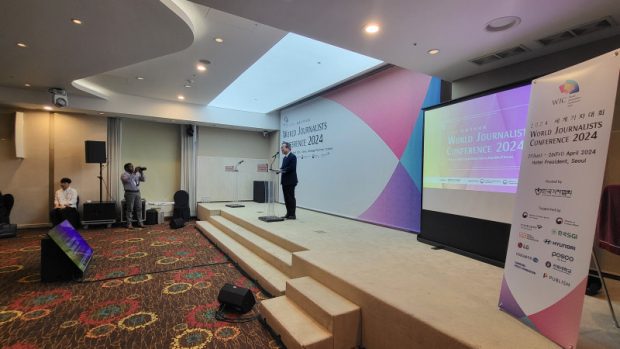
South Korea’s foreign policy committed to rules-based international order: Chung

By Habib Toumi
SEOUL: South Korea’s Global Pivotal State vision begins with a deep commitment to a diplomacy that upholds a rules-based international order, Deputy Foreign Minister Chung Byung-won has said.
Facing an era of multiple crises, the foreign policy vision of President Yoon Suk Yeol’s administration to become a “Global Pivotal State” is centered on actively harnessing Korea’s growing strengths and capabilities to advance freedom, human rights, peace, and prosperity around the world.
“Korea’s Global Pivotal State vision is implemented in three distinct stages: globally, regionally, and at the Korean Peninsula level,” Chung said as he addressed the World Journalists Conference, the annual event that brings journalists from across the globe to the Korean capital Seoul.
“From the ashes of war, poverty, and authoritarianism, Korea has risen as a beacon of democracy, prosperity, and technological innovation. Our success is anchored in our unwavering commitment to democracy, freedom, and human rights,” Chung said.
This explains why President Yoon consistently champions Korea’s goal to transcend geographical boundaries and embrace the role of a Global Pivotal State, he added.
“Our vision is clear: Korea must be a global advocate for freedom, peace, and prosperity, promoting democratic values and fostering international cooperation. Our global allies and partners, who share these fundamental values, have enthusiastically supported and encouraged Korea’s increasing diplomatic, economic, and strategic contributions that extend well beyond the Korean Peninsula. This widespread international support also underscores why Korea is considered a potential candidate to join the G7 if, and when, it expands,” Chung stressed.
Referring to his country’s international collaborations and strategic alliances with NATO and the EU, the senior diplomat said that the security dynamics in the Indo-Pacific region are closely interconnected with those of Europe.
“Given the reciprocal impact of events in Europe and the Indo-Pacific, we must address these global challenges together. This commitment underpins Korea’s efforts to enhance its collaboration with NATO and the EU to defend and restore a rules-based international order.”
Chung that Korea’s recent hosting of the third Summit for Democracy and its foreign minister’s participation in the recent NATO Foreign Ministers Meeting stand as testaments to his country’s dedication to “restoring the rules-based international order and addressing global security challenges that affect our interconnected regions.”
He added that Korea’s third two-year term as a non-permanent member of the United Nations Security Council (UNSC) is occurring at a time when the council’s work is more crucial than ever.

“We are committed to addressing critical global issues, including the situations in North Korea, Ukraine, and the Middle East conflict. Korea will also lead discussions on emerging threats like cybersecurity and climate change, and on key topics such as peacekeeping, peacebuilding, and ‘Women, Peace, and Security.’” Korea, as a member of the Group of Friends for the Protection of Journalists, a coalition within the United Nations, has alongside like-minded partners, consistently advocated for the right to freedom of expression and the creation of a safe environment for journalists to perform their duties without undue interference or intimidation, he said.
“We believe that a free, independent, and pluralistic media is a cornerstone of any democratic system. We will continue to support initiatives that strengthen legal and regulatory frameworks to protect freedom of expression and access to information, and enhance the safety of journalists and media workers,” Chung said. “In an era where democratic institutions face an unprecedented threat all across the world, we hosted the third Summit for Democracy last 10 month, themed ‘Democracy for Future Generations.’ This summit focused on ensuring that advancements in AI and digital technology align with democratic principles, reinforcing our dedication to democracy in the digital age.”
Korea is also deepening its engagement with the Global South. In early June, it will host the inaugural Korea-Africa Summit, a significant step in strengthening ties with Africa.

“This event underscores our commitment to building sustainable and mutually beneficial partnerships with Africa that span a wide range of sectors: trade and investment, energy infrastructure, food security, climate change, global supply chains, and fostering the digital transformation, among others,” Chung said.
The deputy minister stressed that his country is also enhancing its strategic relationships with India, ASEAN members, and following its recent diplomatic outreach to Cuba, it is keen to develop these new connections further.
“On the environmental front, we continue to tackle global challenges such as climate change and development cooperation,” he added.
The deputy minister stressed that following the introduction of the ‘Carbon-Free Energy (CFE) Initiative’ at the UN General Assembly last year, South Korea will strive to launch the ‘Carbon-Free Energy (CFE) Global Task Force within the year.
“We also aim to increase our green Official Development Assistance (ODA) to support low-carbon growth in developing countries.”
A key area of focus for Korea’s Global Pivotal State vision is the Indo-Pacific region, the senior diplomat said.
“This region is crucial, encompassing major maritime logistics routes and representing 65% of the world’s population, 62% of global GDP, and 46% of global trade. It holds considerable strategic importance for Korea, including vital sea lanes such as the South China Sea,” he said.
The deputy minister stressed that maintaining peace, stability, and safety in the Indo-Pacific region is critical to the security of the Korean Peninsula.
“In recognition of this, the Korean government launched its inaugural comprehensive regional strategy, the “Strategy for a Free, Peaceful, and Prosperous Indo-Pacific Region,” in 2022, followed by “The Action Plan for a Free, Peaceful, and Prosperous Indo-Pacific” last year,” he said.
These strategies emphasize South Korea’s commitment to promoting freedom, peace, and prosperity, strengthening a rules-based order, enhancing democracy and human rights, and assisting regional nations in building their capacities, Chung added.
“To advance the vision for a free Indo-Pacific, Korea is committed to forming partnerships with countries that uphold the values of freedom, the rule of law, human rights, and international norms,” he said.
“We will stand with the international community in responding firmly to actions that threaten these universal values and norms. Our Indo-Pacific strategy hinges on the robust Korea-US alliance and trilateral cooperation among Korea, Japan, and the United States. We also recognize that ASEAN centrality is a key element of the strategy. Partnerships with countries such as Australia, Canada, New 14 Zealand, and India are also essential in pursuing this strategy.”
The inaugural trilateral Indo-Pacific Dialogue between Korea, the US, and Japan in January provided a meaningful platform to share assessments of geopolitical trends shaping the Indo-Pacific and to enhance trilateral cooperation.
“We reaffirmed our commitment to cooperate through regional forums and groupings, including ASEAN and the Pacific Islands Forum. We also emphasized the importance of collaborating to enhance regional economic security, resilience, and development. This includes taking action to combat climate change and engaging with Indo-Pacific partners on issues such as information and communications technology, cybersecurity, and emerging technologies.”
The Republic of Korea also reiterated its commitment to maritime security and law enforcement cooperation in accordance with international law, focusing on support for capacity building in the region, Chung said.
“Through the Indo-Pacific Strategy, Korea has elevated ASEAN to a key strategic partner in the Indo-Pacific region. In 2022, we launched the Korea-ASEAN Solidarity Initiative (KASI) alongside the Indo-Pacific Strategy at the 23rd ASEAN-ROK Summit. Last year, the Korean government officially presented eight core lines of effort to implement KASI.”
Korea is now focusing on enhancing comprehensive cooperation with ASEAN in areas such as security, defense, and the defense industry, in addition to the existing economic and social sectors.
Chung told the conference that maritime security cooperation with ASEAN has greatly improved over the past two years and that efforts are underway to establish an ASEAN-ROK Comprehensive Strategic Partnership this year.
He pledged that his country would keep the door to diplomacy open with North Korea.
“Although Pyongyang has not been answering our calls for dialogue, we will keep the door to diplomacy open, and create a strategic environment that leaves North Korea no option but to return to dialogue,” he said.


